Forty K-12 teachers from across the state recently gathered in Hillsborough for an interactive learning retreat focusing on Tar Heel history. The conference was sponsored by the Carolina K-12 program in the College of Arts & Sciences.
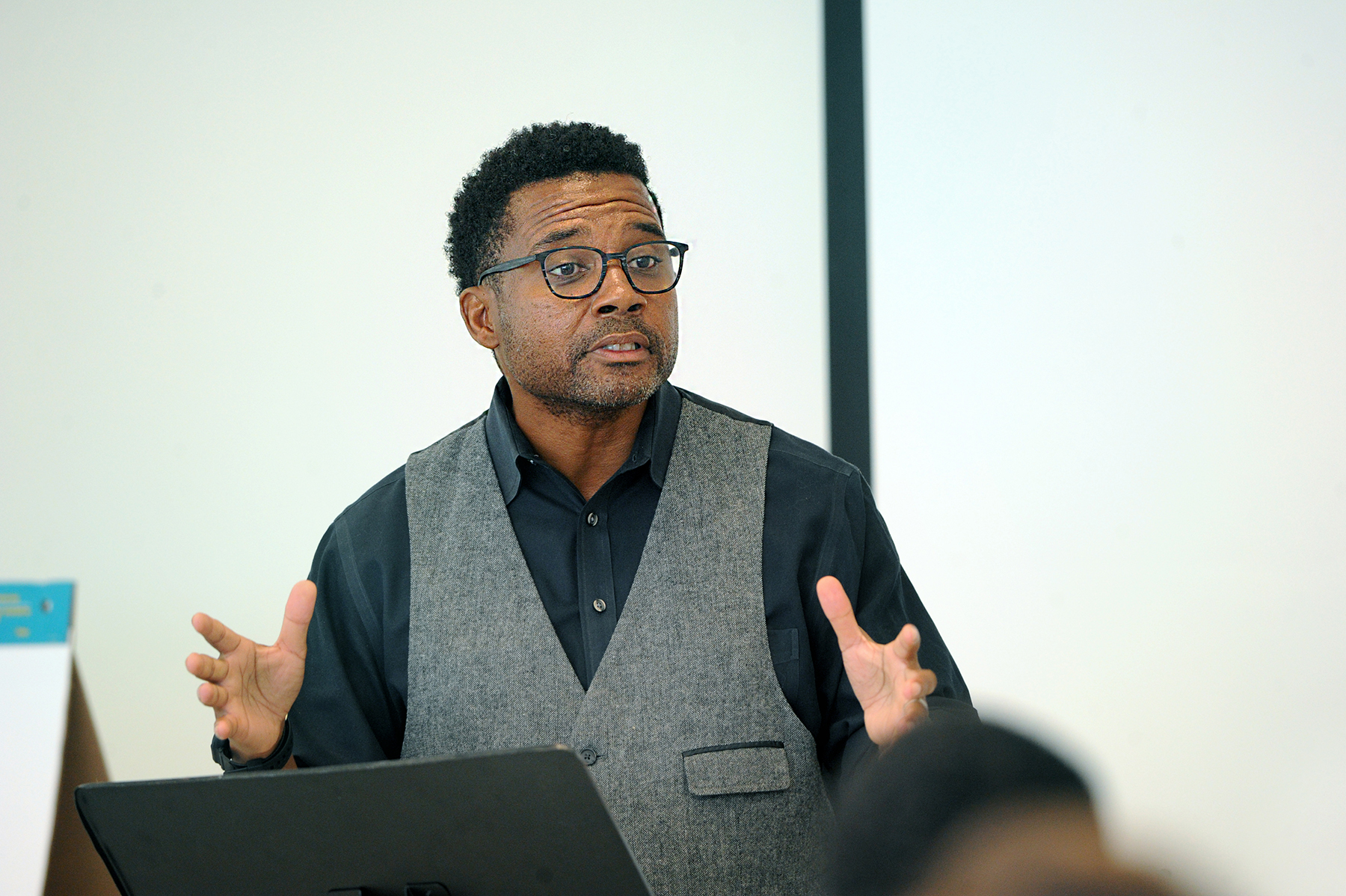
Actor and playwright Mike Wiley (MFA ’04) captivated a room of K-12 teachers as he portrayed important figures in Black history from Emmett Till to Claudette Colvin. Throughout the presentation, he pulled in teachers as improv actors, encouraging them to become a part of the story.
While young people today may know about Emmett Till, they may not know the story of Claudette Colvin of Montgomery, Alabama, who in 1955 at age 15 refused to move to the back of a bus and give up her seat to a white woman. This was nine months before Rosa Parks would make history with the same action.
Telling these true stories can evoke empathy, Wiley said.
“When we place the truth in plain sight, we give students the opportunity to do what they do best — be curious,” he said. “What you and I do is not that far apart — we are looking for ways to inspire students. And empathy makes us human.”
After enduring a year like no other, 40 teachers from 22 North Carolina counties gathered July 27-29 for the William Friday Teachers Retreat at the historic Colonial Inn in Hillsborough.
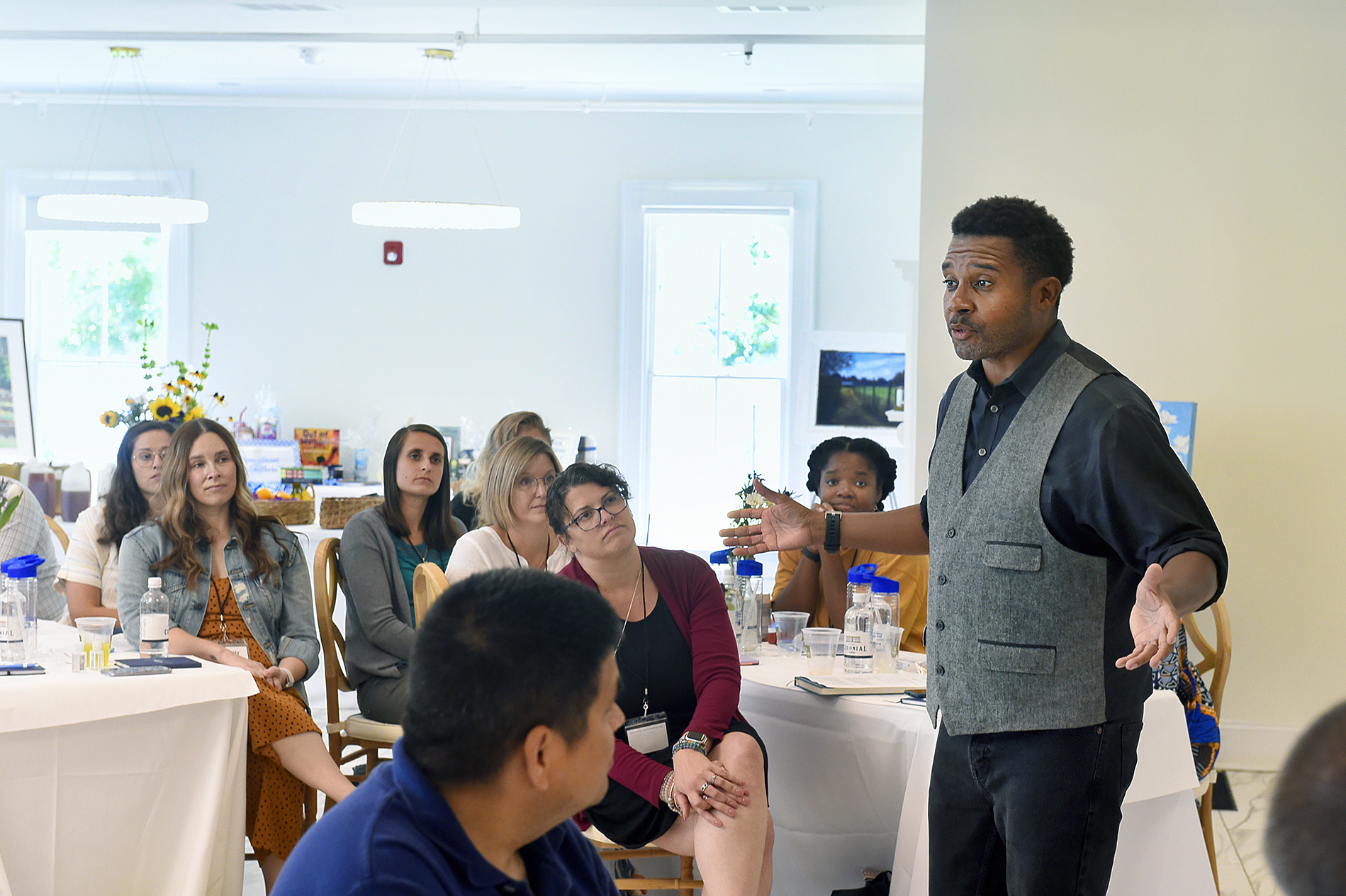
The professional development event, offered at no charge to teachers, was sponsored by Carolina K-12, a unique program of Carolina Public Humanities in the College of Arts & Sciences. Support was provided by the nonprofit North Caroliniana Society. Carolina K-12 embodies the University’s public service mission by extending the scholarly resources of UNC-Chapel Hill to North Carolina’s elementary-to-high school teachers.
The theme of this year’s retreat was “Carolina Voices: Exploring the Tar Heel State through History, Culture and Rejuvenation.” Throughout the three-day event, teachers heard presentations from guest speakers (many with ties to UNC) and participated in historic walking tours, engaging discussions and interactive events — all focused on North Carolina and Southern history.
To date, eight Friday retreats have served 257 teachers representing 77 counties. Those teachers will reach a minimum of 35,980 students across the state each school year. (See a map representing the statewide reach of the retreats).
Carolina K-12 launched a virtual education series in fall 2020 due to COVID-19.
“We were worried would teachers be ready to return to an in-person retreat? Would they feel like doing any professional development? It’s been such an exhausting year,” said Christie Hinson Norris, a former public school teacher who has been director of Carolina K-12 since 2006. “But it turns out they were very ready.”
From Southern plates to hidden voices
A recipe tells its own story, according to KC Hysmith, a Ph.D. candidate in American studies. Her session “Our Story is Told Through Our Plates” explored how food is intricately tied to history, culture and memory.
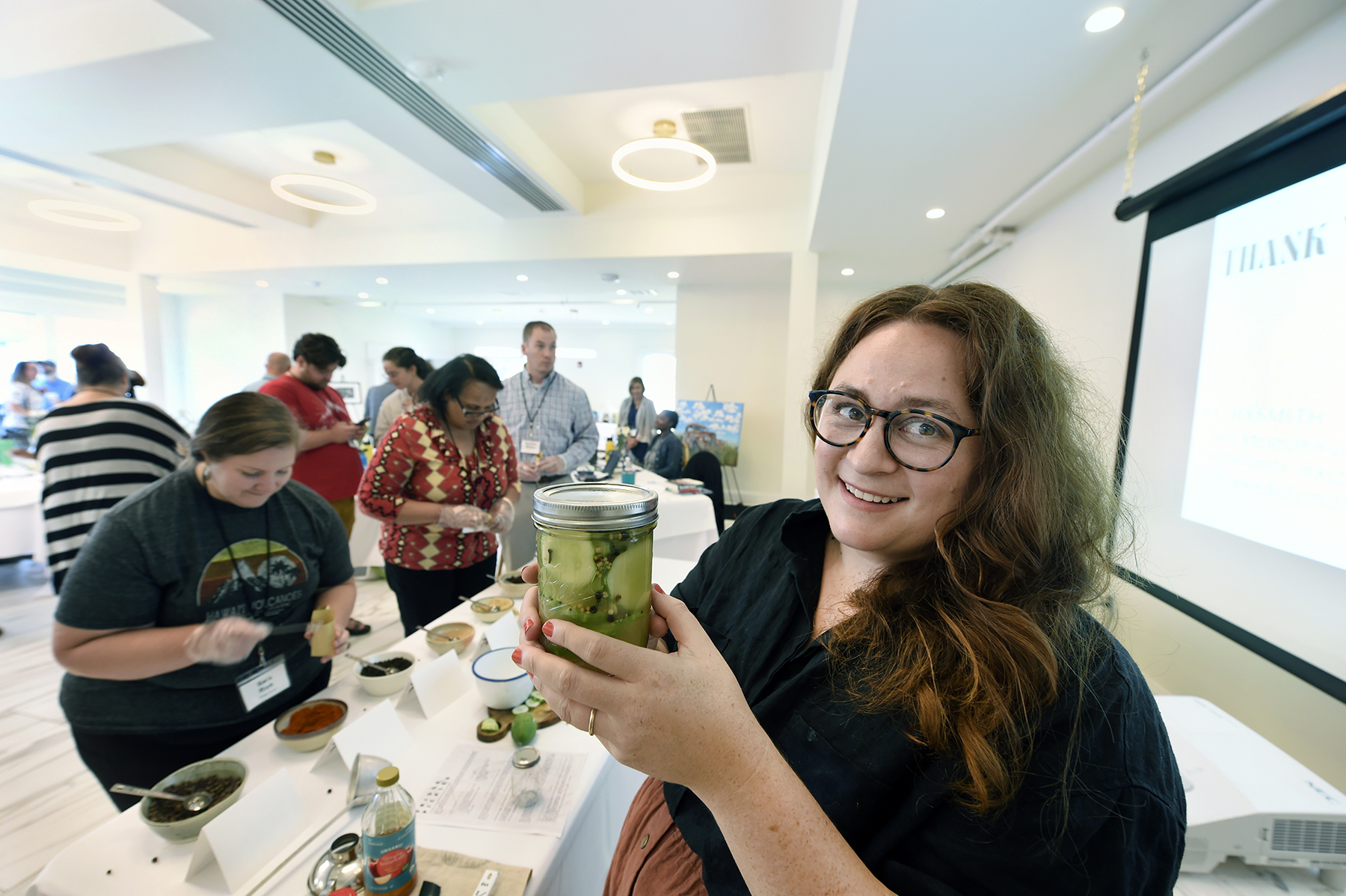
In teaching a lesson about food, Hysmith encouraged teachers to choose a recipe and ask students to think about when it was published, the author and the ingredients.
She introduced them to Black female cookbook author Abby Fisher’s 1881 publication, What Mrs. Fisher Knows about Old Southern Cooking. Hysmith then invited them to a table up front lined with cucumbers, cloves, ginger root, mustard seed, black peppercorns and other spices. She showed them how to make their own easy refrigerator pickles using a recipe adapted from Fisher’s book.
“Food can get people talking about complex topics, bringing in anthropology, gender studies, land ownership, agriculture and more,” Hysmith said. “Recipes can teach about language, math and science.”
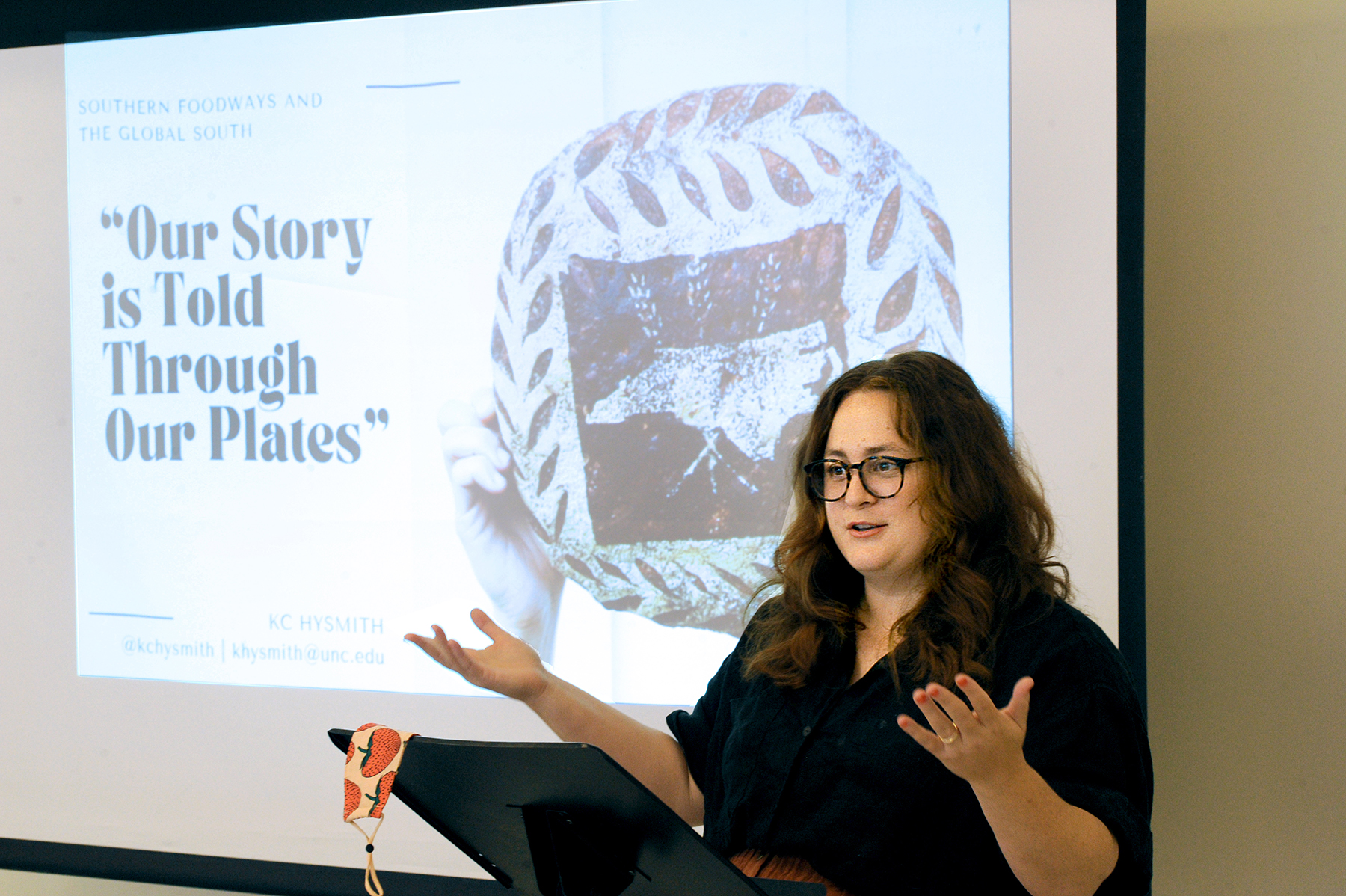
Teachers left with their own copy of American studies professor emerita Marcie Cohen Ferris’ book, The Edible South: The Power of Food and the Making of an American Region.
Norris led a session, “North Carolina’s Hidden Voices,” sharing her top list of “ordinary North Carolinians doing extraordinary things, yet many of these narratives are less known.”
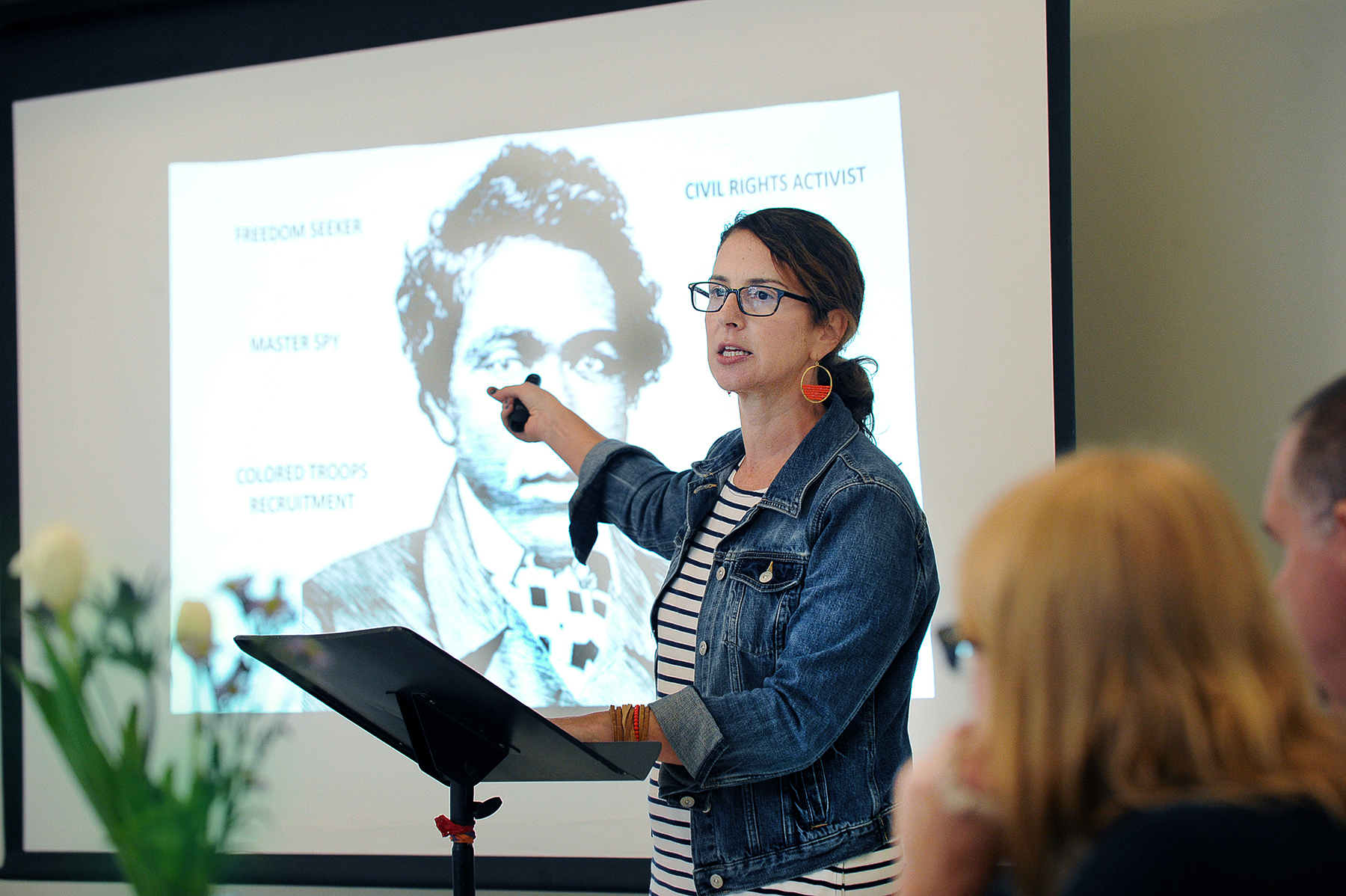
One of those North Carolina heroines was Elizabeth “Lizzie” Hobbs Keckly, an enslaved woman who lived in Hillsborough. After earning money to purchase her freedom, she became a dressmaker for First Lady Mary Todd Lincoln. She founded the First Black Contraband Relief Association to assist formerly enslaved refugees making their way to the nation’s capital. She also wrote a memoir.
Felicia Watkins, an elementary school teacher from Duplin County, said “I believe Christie has revived my teaching career. She is a valuable asset to every teacher in the state.”
“Words cannot explain it — I struggle every year with feeling unappreciated, and I really needed this retreat,” she said.
In other sessions, performer Mary D. Williams took teachers on an aural history tour of slavery and civil rights, through a combination of spirituals and protest and gospel songs. They left with a copy of her CD to use in their classrooms.
They learned about North Carolina’s textile and labor history, heard how to elevate indigenous history in the classroom and took a tour of a replica palisade of the Occaneechi Band of the Saponi Nation. They listened to teaching assistant professor of creative writing Tyree Daye read his award-winning poetry; his session was followed by a book-signing.
The ‘glitter and the glue’
“I want teachers to feel like the scholars that they are. We try to include a mixture of presentation formats because we really want them to take all of this directly back to the classroom,” Norris said. Each session on the agenda was hyperlinked so teachers could connect to retreat presentations and curriculum materials. (Carolina K-12 has an online database of over 1,000 lessons and resources for use by any teacher in K-12 classrooms).
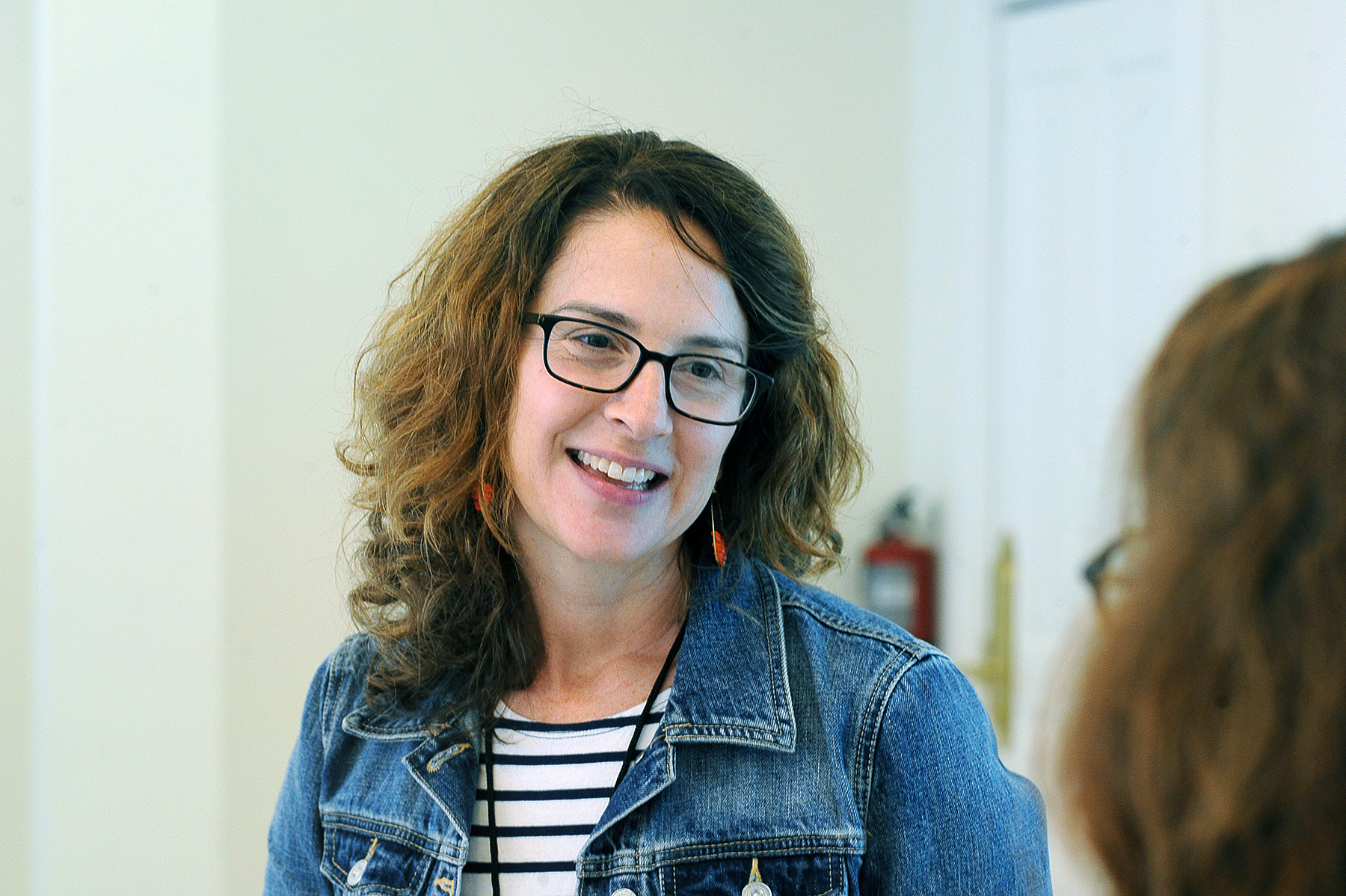
Carolina K-12 also tries to support local artists and businesses, Norris noted. Katie Hayes, a printmaker and founder of New South Pattern House, designed a bookmark of Hillsborough that was provided to each teacher. Teachers were treated to dinner at Antonia’s, a local Italian restaurant.
Norris said they also ask teachers who are selected for the retreat to share information with other teachers in their home counties; more than 200 teachers were on the waiting list for this year’s event.
Teaching is often a 24-7 job, but then you add in the challenges of a pandemic, and Norris added that many teachers have said it was the hardest year of their career.
“After all that has happened, they are willing to keep doing this work. They keep showing up,” she said. “And for many kids, even with the challenges of remote learning, teachers were a lifeline. They are literally the glitter and the glue. I’ve never seen them quite so tired, yet so committed and dedicated.”
By Kim Spurr, College of Arts & Sciences
***
Teacher Testimonials
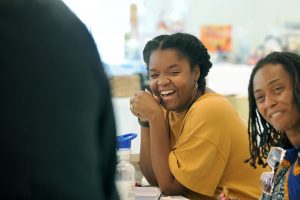
“This was absolutely the best professional development that I have ever been to. The attention to detail was phenomenal. We were treated like royalty, and I felt like I was valued and heard. They takeaways are applicable to my school setting, and I will be implementing them as soon as school resumes. This experience breathed new life into my very weary teacher soul!” — Amy White, fifth-grade teacher, Lenoir County
“As a first-year teacher, it has been so disheartening to feel like the world thinks that teachers are incapable of doing what they’ve been trained to do. This conference reminded me that there are still people out there that value teachers! I feel invigorated to take on my next year with confidence.” — Liz Davis, eighth-grade teacher, Chatham County
“This experience was absolutely a breath of fresh air. The material was fantastic because it was a lot of hidden voices I didn’t know about. It was also nice to see such diverse presenters.” —Benjamin Thomas Reid, 10th-12th grade teacher, Ashe County
“The speakers were amazing. The books and resources provided were unparalleled. And the venue! The fact that we were made to feel important, valued and treasured is something that I will carry with me for many, many years to come.” — Megan Bostian, eighth-grade teacher, Franklin County
“My biggest takeaway from the event is that it is important for educators to find curriculum materials that accurately teach and engage students in thinking critically about how our country and state have come about and choosing methods that can foster genuine discussions between unique and diverse groups of people.” — Jennifer Wells, seventh-grade teacher, Alamance County
